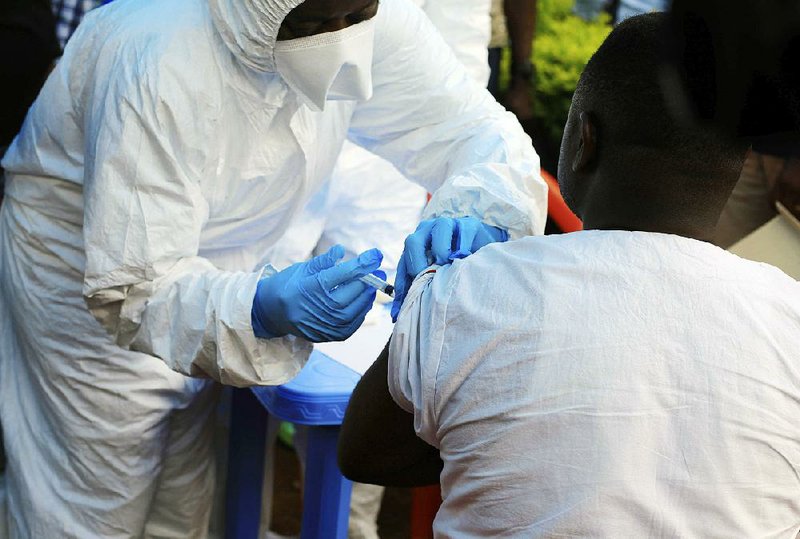Ebola shots aim to curb Congo outbreak
DAKAR, Senegal -- Ebola vaccinations began Wednesday in Congo's latest outbreak of the deadly virus that has already claimed at least nine lives.
Health officials have warned that containing the outbreak in North Kivu province is complicated by the presence of multiple armed groups vying for mineral-rich land in the northeastern region that borders Uganda and Rwanda. Ebola screening of travelers at the Congo-Rwanda border was "already in high gear," the World Health Organization said.
The latest outbreak, declared Aug. 1 in Mangina village in the Mabalako health zone, is Congo's 10th outbreak since the virus was identified in 1976. This outbreak has seen 17 confirmed Ebola cases, 27 probable cases and 46 suspected ones.
Some 36 people have died from hemorrhagic fever in the outbreak, but officials said many cannot be confirmed as Ebola deaths at this point.
Three thousand doses of the Ebola vaccine are being sent from Kinshasa, the capital, and will be used first in the Mabalako health zone and in the nearby city of Beni, which has more than 680,000 people.
The experimental vaccine was used in an earlier, unrelated outbreak in Congo's northwest that was declared over last month.
The first to be vaccinated are health workers, contacts of confirmed Ebola cases and their contacts in what is called a ring vaccination campaign. The strategy is the same that was used to contain the previous outbreak in Equateur province, with more than 3,300 people vaccinated.
Saudis execute killer, display his body
Saudi Arabia executed and hung out the body of a Burmese man in the holy city of Mecca on Wednesday in a rare form of punishment reserved for the most egregious crimes.
Elias Abulkalaam Jamaleddeen was accused of breaking into the home of a woman from Burma, firing a weapon and then repeatedly stabbing the woman, which led to her death, the official Saudi Press Agency reported, citing an Interior Ministry statement. He was also accused of stealing weapons and trying to kill a man whose home he broke into, as well as attempting to rape a woman.
The ruling was supported by the country's Supreme Court and endorsed by the king.
What the Saudis term crucifixions entail hanging a body in public after an execution, and are unusual. A Yemeni man was crucified in 2010 for raping and killing a girl and fatally shooting her father.
Yemen airport often target, groups say
CAIRO -- Aid groups say the international airport in Yemen's capital has been hit with an average of one bomb every two weeks since a Saudi-led coalition closed it to all commercial traffic two years ago.
The Norwegian Refugee Council and Cooperative for Assistance and Relief Everywhere say the coalition has carried out 56 airstrikes over the past two years on the airport in Sanaa. Shiite rebels known as Houthis seized the capital and its airport in 2014, and control much of northern Yemen.
The aid groups cited figures from the Yemen Data Project, which monitors the war.
Johan Mooij, the relief group's director in Yemen, said the airport has become a "a symbol of aggression and oppression for a very large population."
The coalition, which has been at war with the Houthis since 2015, controls Yemen's airspace.
Zimbabwean denied asylum in Zambia
HARARE, Zimbabwe -- A top Zimbabwean opposition official fled to Zambia on Wednesday but was denied asylum and is expected to face arrest at home as concerns rose over a government crackdown after last week's disputed presidential election.
Tendai Biti, Zimbabwe's former finance minister and a leader of the opposition Movement for Democratic Change, said he is going to be deported, according to Dewa Mavhinga of Human Rights Watch.
Mavhinga said Biti told him: "It looks like they have made a decision to hand us back to the junta. We are truly in God's hands."
Biti's plight follows scenes of the military opening fire in the streets of Zimbabwe's capital a week ago, killing six people, and growing opposition claims of harassment. The events further challenged assertions by newly elected President Emmerson Mnangagwa of a "flowering" of democracy after longtime leader Robert Mugabe stepped down in November under military pressure.
The Movement for Democratic Change has denounced Mnangagwa's July 30 election victory as fraudulent and vowed to challenge it in court this week.
Biti had declared before the official election results were announced Friday that opposition leader Nelson Chamisa had won, a claim also made by Chamisa.
The Zimbabwe Electoral Commission has said it is illegal to release results before its own official announcement.
Biti was named along with Chamisa in a search warrant issued last week that said they and several others were suspected of the crimes of "possession of dangerous weapons" and "subversive material" as well as "public violence," according to a copy of the warrant.
A Section on 08/09/2018
